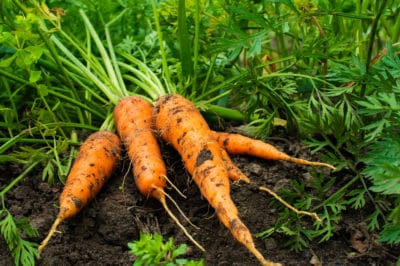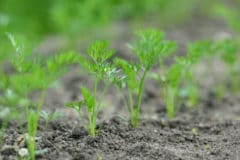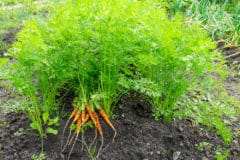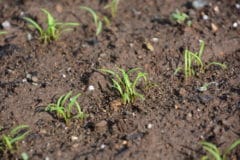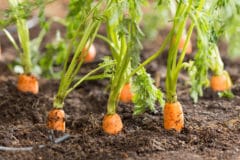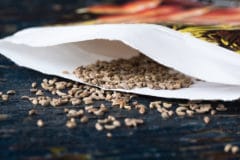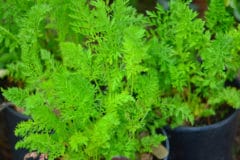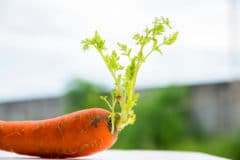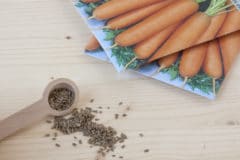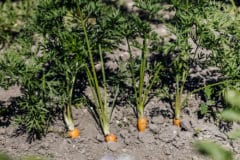When your carrots are ready to harvest.
Carrots are generally mature about ten to 12 weeks after planting. You’ll be able to tell if plants are harvest-ready by brushing aside the dirt at the base of the foliage; the carrot shoulder will be visible. Based on the variety you planted, the shoulder should be at least half an inch in diameter. At this time, you can harvest your carrots.
If you planted your carrots in early spring, you could be harvesting as early as the first weeks of June. Remember, though, that you can plant carrots every two to three weeks and have carrots ready to harvest all through the early summer and into the fall.
Choosing to plant on an ongoing schedule guarantees that you’ll have fresh carrots almost until it’s time to plant again. You may want to label your garden rows with planting dates, or create a calendar with harvest dates. This organizing means you don’t have to check your plants every day, trying to determine if they’re ready to harvest.
You can even wind up harvesting carrots in the first weeks of the winter; a cool weather plant, carrots love chillier temps and will happily grow in the cooler days of late fall and early winter.
How to pull carrots.
- Water your garden to help soften up the soil.
- Using a garden fork or a similar tool, loosen the soil around the top of the carrot.
- Insert the garden fork, curved surface facing the carrot, into the ground about six to eight inches.
- Pull the garden fork toward your body and away from the carrot plant.
- Once the carrot has been loosened, grasp the foliage near its base.
- Pull gently but firmly; do your best not break the carrot root
Don’t give up and start digging your carrots out of the ground; you could damage or break them.
Work slowly and carefully to ensure that your harvest is successful and that your carrots are not broken in the process. Sometimes, a carrot can be a bit recalcitrant about coming out of the ground, but with patience and persistence, you’ll soon be munching on carrots you grew yourself.
You can harvest early if you want to.
When your carrot plants are about six to eight weeks old, they will be edible, although small. Baby carrots are a popular snack, and a great addition to salads, soups, and lunch boxes. Obviously, pulling your carrots at this point means a reduced harvest later in the season, but if you enjoy little bit-sized carrots, it’s worth the trade-off.
To harvest baby carrots, simply dampen the soil, loosen the top few inches (your fingers should do just fine) and pull gently while grasping the base of the greenery.
You don’t have to harvest.
The great thing about carrots is that they can be left in the ground until you’re ready to eat them. Being a root vegetable, they enjoy being in the earth and will continue to grow some while they wait for you.
If you want, you can leave your carrots in the ground for quite some time. In fact, you can actually store them in your garden by simply leaving them in place; they’ll remain fresh and ripe for months this way. Just make sure not to leave them in place if the ground is likely to freeze.
In fact, if you leave carrots to grow through the early autumn and beyond the first frost or two, you’ll find that they are sweeter than the ones you harvested earlier in the season. In order to survive the winter, your carrot plants will store more sugar in the root, making them much sweeter than those harvested earlier.
After the harvesting is done.
Once you’ve harvested your carrots, be sure to store them properly. If you don’t choose to leave them in the ground to wait until you need them, then you’ll want to keep them in a manner that ensures they’ll be fresh and delicious when you finally use them.
A great way to do this is to fill a large tub with moist sand and bury your carrots in it. Make sure the sand stays damp, and keep the tub in a very cool place where the temperature hovers just above freezing. As long as the carrots are buried in the wet sand, they’ll stay fresh, crisp, and delicious.
You can also simply pack your carrots into a container of some sort, cover them in cold water, and refrigerate. The method works well, too, so long as you remember to change the water in the container every two or three days.
Of course, freezing and canning are good choices too. The idea is simply to preserve that fresh, delicious, just-picked taste of ripe, ready carrots.
